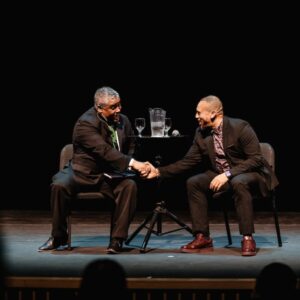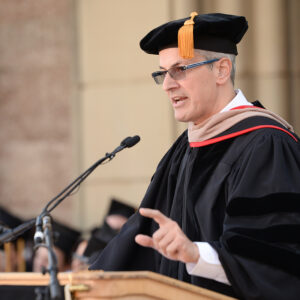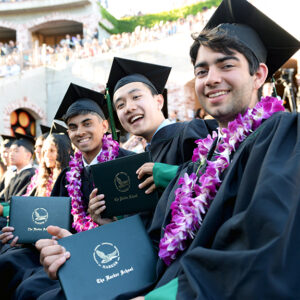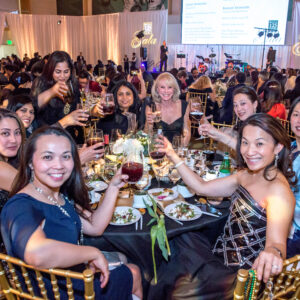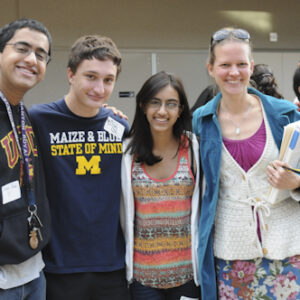This article originally appeared in the summer 2010 Harker Quarterly.
Good morning to all our esteemed guests: members of the board of trustees, administration, faculty and staff, alumni, families, friends, and to our true guests of honor, the graduating class of 2010. I currently hold the privilege of making a few remarks of farewell at graduation. This address is the last requirement standing between you and your diploma. Knowing this, and aware of the fact that you outnumber me, I will continue the tradition of confining my remarks to one page of single-spaced, size twelve font. I will continue to refrain, however, from making any promises about the size of the margins.
In this address, I typically try to give one final piece of advice, such as, “Dare to be wrong” or, “Be like Curious George.” Today I want to take advantage of the fact that we are wholly focused on one thing, your graduation. That focus is nice, isn’t it? Together we can feel the wind, see this commanding view, contemplate the future, and maybe even listen to our own thoughts. Today we are one consciousness delicately caught in that timeless space between past and future. Sounds deep, doesn’t it?
Today and in the future, you will have more and more claims made on your attention, and I am sure you will be asked to multitask. We all have unquestioning faith in this wonderful skill, multitasking, and we are often told that we need to multitask to succeed in the workplace. But I want to counter that the world does not need more multitaskers. We need more singletaskers, people who think deeply and slowly about one thing. The world needs, I believe, people who can, like Einstein, devote three-and-a-half years to a single problem, such as why light behaves like both a particle and a wave. So my advice to you today is, “Dare to singletask.”
Now I know that “Dare to singletask” isn’t very catchy. Multitasking sounds much cooler. Who wants to singletask? According to Microsoft Word, it’s not even a word. (Multitask is, by the way.) I considered using the word “monotask,” which at least has the benefit of beginning with an “m,” like its counterpart “multitask.” But I like “singletask” because of its conjuring of “singlemindedness.” Besides, monotask sounds like something you do when you have mononucleosis, or runs the risk of sounding monotonous. Singletask sounds like you are doing it on purpose.
And purpose is the purpose. Pascal said, “All of man’s trouble stems from his inability to sit quietly in a room alone.” I am asking you to do just that. Sit in a room alone. Since most of you will have college roommates whom you cannot eject, find any place that will do. A library corner, or the woods. Just be alone with your thoughts. Do one thing deeply and well. Struggle with a very difficult book for months. Stare at a flower. Think about the purpose of life.
This is not an anti-technology rant. I love technology as much as the next person. I have an iPhone and a Kindle. I don’t Twitter, but I think I know what it means. If my wife allows me, I might even get an iPad. Rather, I am just calling for more horsepower where we need it – deep, analytical thinking about one important topic. The inscription at the entrance of the Oracle at Delphi was “Know thyself.” Greeks visited Delphi to find answers, but the answer they received was to look within.
Besides, you may not be as good at multitasking as you believe. Research by Clifford Nass at Stanford University shows that chronic multitaskers who think they are good at doing many things at the same time actually perform poorly at multitasking. He says that most of what we know about psychology suggests that the brain is not very good at multitasking, yet we are called to do it more and more.
So when your future boss or professor asks you to do two or three things by next Wednesday, do them well by next Tuesday. Do not say, “Excuse me, but my head of school advised me not to multitask at graduation.”



